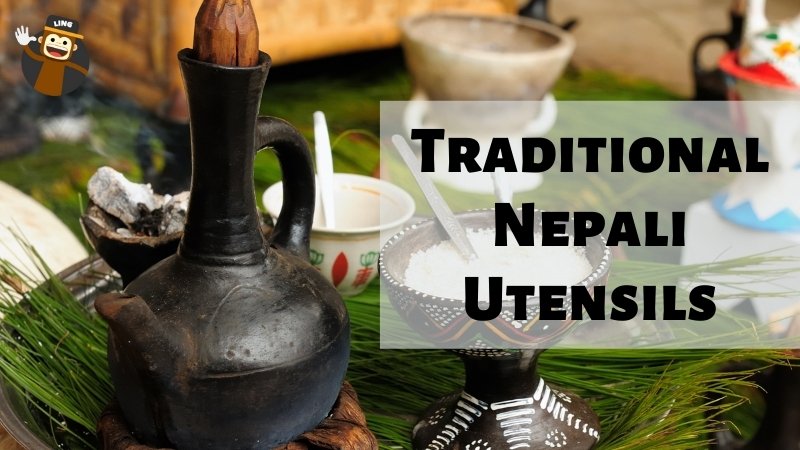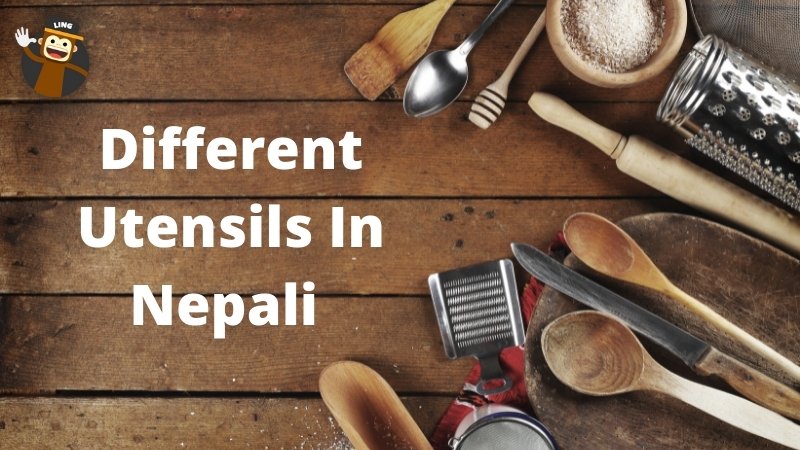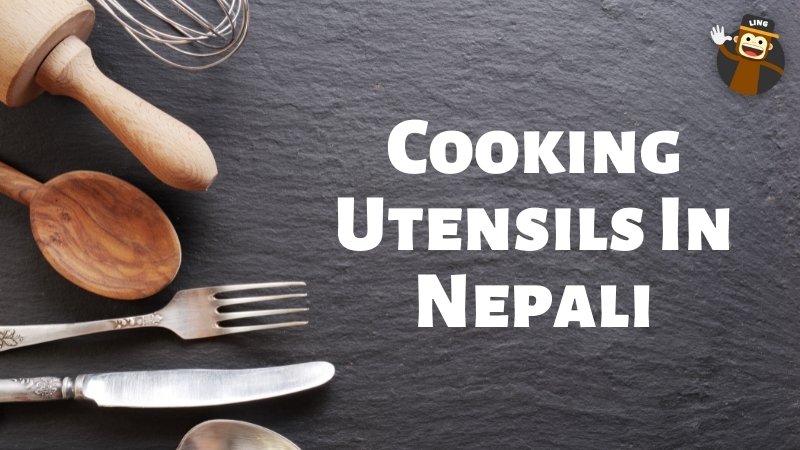Have you ever wondered what Nepali people use as their kitchen utensils to create delicious traditional dishes like Dal Bhat, Dido, Momo, etc.? Well, every culture utilizes its different utensils that will help them cook the finest dishes. If you go to Nepal, you will find out new kitchen utensils such as चिनिया (Chiinia), बेलाना (Belana), and करूवा (Karuwa), all of which you must have never heard of before.
However, everyday utensils like the round-bottomed frying pan, wooden rolling board, rice cooker, cooking pan, etc., are also popularly used for concocting Nepali food. If you are confused, don’t worry. This blog will give you a clear sense of cooking utensils in Nepali, along with many translations for standard ones.
With that said, you will not only become a pro speaker in Nepali but also get a great insight into the Nepali food culture that one can never miss out on! So, want to learn more? Continue reading and experience the Nepalese kitchen culture in one read!
Traditional Cooking Utensils In Nepali You Didn’t Know

If you have tried Nepali foods, especially momo, you will know that it is authentic, filled with flavors, and mouth-watering. From the streets of Nepal to its neighboring countries like India, every other nation craves the taste of curried dishes and meat-filled savory items that are flavorful to their core.
However, to make such dishes, there are also kitchen secrets that most of you are unaware of. These unique dishes cannot be cooked without the excellent use of different utensils that the Nepali people have stored for ages. It is true that in modern times, nothing can undo the potency of iron plate utensils and plastic containers. However, the Nepalese kitchen still respects the indigenous tools we will learn about in this section. You might not find an English version of these tools, but a local can only ascertain the importance of such devices.
1. Silauto And Lohoro
Spelled as सिलौटो र लोहोरो, Sialuto and Lohoro is one of the most common and must-have utensils of the Nepalese kitchen. From grinding spices to different types of meat, सिलौटो र लोहोरो is a tool that is seen as the most simple accessory in kitchens that ever existed in the world. Similar to mortar and pestle, the traditional one in Nepal is made of stone that does not break or damage easily.
Mostly it is made of dense rock, which makes it easy for the user to keep minimum spillage and waste as it prevents severe movements while grinding. Also, the material keeps the spices healthy and removes any foreign agents.
2. Phosi
Another quite common utensil that you will find in Nepal is Phosi, spelled as फोसी. It is a pure Nepali name for a tool that looks like a flat round woven tray from below and has a wide opening with a short height. It is mainly used to store grains and solid items like pulses.
It is durable, mostly made of clay and bronze, and easy to use. Although the number of its original form is lacking lately, it is still prominent in village areas. In every household, you will find it beside the stove being used to pour a portion of grain into another.
3. Dhawo
धौ or Dhawo is somewhat similar to a ladle in Nepal. It works as one of the most comfortable cooking tools, from cooking meat to deep frying sausages. It is a metal scoop with a long handle that comes in handy while serving soups.
Especially when it concerns cooking a large amount of food in big-sized utensils, a dhawo works best for serving and pouring. It prevents accidental burning and makes cooking more comfortable.
4. Korsa
A korsa, spelled as कोर्सा, is Nepalese for a grater. It is a kind of grater used for any thin and thick gratings. As you can already guess, it is another must-have utensil that a kitchen will be incomplete without. From spices to vegetables and meat and fruits, whenever it comes to cutting things precisely, nothing can beat the power of a korsa.
Since Nepali foods have a lot of side dishes like salads and vegetable curry, a grater is a must to reduce cooking time and make Nepali food more delicious.
5. Chauka And Belana
Chauka and Belana are what we call a rolling board and rolling pin. Spelled as चौका and बेलाना, it is one of those supporting utensils that are used to make flat tortillas. The chauka looks like a plate with a flat surface and the belana is a cylindrical rolling pin, primarily wooden, that helps make perfect round plate tortillas.
However, it is also used to make a thin circle-shaped batter which is then shaped into a samosa or momo. Since snacks are popular, one has to have a Belana to make cooking more practical.
6. Karuwa
Although not very common in the western world, a Karuwa or करूवा is a very authentic and traditional utensil in Nepal that has a body of a mug-like water pot. However, it has a broader base than the upper part and a small pipe-like opening through which water is poured.
It is mainly used to store hot water as water loses heat at a slower pace due to the shape of the container. Made of bronze or thick brass, it is one of the metallic containers you will hardly find outside Nepal.
7. Chakku
In a very simple sense, a Chakku or a चक्कु is a knife in English. It is the primary instrument composed of a blade fixed into a handle. Used to cut different kinds of things, from chicken to vegetables, it is a tool that no kitchen can miss out on.
In Nepal, you will find different kinds of knives made of other materials. Traditional ones also have blades of big sizes and handle made of wood that have hand-made carvings. Even colorful and beautiful ones are also sold in the market for decoration.
8. Chiinia
Talking about Chiinia, spelled as चिनिया, it is a pair of tongs that is long with blunt edges. Mostly helpful for turning tortillas or chapati, as they call it, and picking up small items while being cooked or roasted.
Not very useful to cook rice or eat food, it is one of those tools that help us make perfectly heated and roasted dishes. It is also pretty standard outside the country.
9. Jhasiger
झासिगर or Jhasiger is a spatula or metal spoon with holes that is used to drain excess water or oil from the food. Mainly when picking up a fried object from a frying pan or draining water from boiled rice, a jhasiger is quite helpful.
Although steel ones are usually found, a wooden spatula or spoon of this kind is also quite affordable and normal in Nepal.
10. Karai
Another very frequently used tool is कराई or Karai. Like a cauldron, it is a deep, wide-mouthed iron pan with two handles. They are mainly used for deep frying food like halwa, sausages, etc.
It is similar to a frying pan or a fryer with a spherical bottom; however, the traditional karai is much more heavy, dark, and big.
More Traditional Utensil Names
- Tawa-तवा (Iron plate)
- Tai tapke- ताई टपके (Spherical pan)
- Tanpa- तान्पा (water pot)
- Kachora- कचोरा (basin)
- Jhir- झिर (Skewer)
- Gagro- गाग्रो (container)
- Tilarke- तिलार्के (round bottomed frying pan)
- Chimta- चिम्टा (tongs)
- Chulesi- चुलेसी (typical local knife)
- Amkhora- आमखोरा (water pot)
- Khal Batta- खल बट्टा (mortar and pestle)
- Kasaudi- कसौदी (Rice cooker)
Kitchen Utensils In Nepali

In this section, we will encounter words related to all the utensils we see in a typical kitchen. From pans to spoons, you will get to know about all. So, keep reading.
A-L
M-Z
Wrapping Up!
Now that you know how to spell and pronounce Nepali utensils, you have enhanced your language vocabulary twice than earlier. Learning the kitchen vocab in Nepali will not only make your Nepali food journey easier but will also help make conversations with the locals. If you are a first-time traveler or a blogger, these words will surely make your trip more relaxing and informative.
So, if you think this blog was helpful, head to the Ling App and check out more blogs on different topics, such as moods and emotions, emergency phrases, and many more. Just download the app from Playstore or Appstore and start learning right away!
Learn With Ling App

If you are wondering why you should use the ling app, this is all you need to know.
Ling is one of the most versatile language learning apps that has satisfied the thirst of many travelers. From Spanish to Japanese, you can learn all types of languages with different topics like animal names, vegetable vocab, app guides, etc. Unlike other sites, this app will provide pictures, videos, and even audio translations that make learning fun and interesting. So, what are you waiting for? Download Ling now!

















